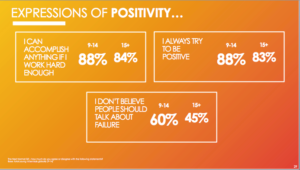The New Millennials Will Keep Calm and Carry On – Younger vs. Older Millennials in The Next Normal

Today, 18 June, our colleagues at MTV US unveiled the results of their “The New Millennials Will Keep Calm and Carry On” study (see the press release here)
The results of this study mirror the international results of our “The Next Normal,” for which we went to 24 countries to define the attitudes, behaviors, and aspirations that make global Millennials unique. We separated them into three groups: Early or Older Millennials (25-30s), Core (15-24s), and Late or Younger Millennials (9-14s). From this analysis we can draw comparisons between the younger and older end of Millennials across the globe – all numbers below refer to the global 24-country averages.
As we have learned, across the generation the economic situation is taking a grave toll on Millennials. This continues to the younger end who pragmatically face the issues.
This includes their awareness of their situation and earning potential vs previous generations – only 26% of the Under 15s today believe that they will “earn more than their parents” compared to 47% in 2006.
The Younger Millennials are the happiest segment of the generation – and their positivity is increasing. They are also hard-working and oriented toward achievement.
- 88% of 9-14s consider themselves happy, compared with 70% of 25-30s. And this 88% is higher than in 2006 on a similar but not directly comparable question.
- Nearly 8 in 10 agree that they “will not settle for anything less than what makes me happy”
- They are more likely than 25-30s to agree that it’s important to study hard when younger to get a better job and to believe they can accomplish anything they want if they work hard enough
- Younger Millennials express attitudes that disprove myths around laziness and taking things for granted: they are go-getting and achieving in their outlook and prepared to work hard … and increasingly so:
- 90% of them agree it’s important to study hard when younger to get a better job when older compared to 81% of 25-30s
They express confidence and a belief in… themselves and their generation
- Winning is a good slogan for my generation. 78% of 9-14 / 63% of 25-30
- I’m smarter than other people; 64% of 9-14/ 58% of 25-30
Being happy is still the most important sign of success, but beyond that we are seeing some minor movements in what it means to be successful.
- Happiness has always been the top sign of success for youth, and that hasn’t changed They are overwhelmingly happy – 87% describing themselves as very happy.
- This compares to an average of 70% among older Millennials around the world (still a very high figure, given the many challenges faced by this generation).
Being part of a loving family and being rich are more important to 9-14’s today, while having an enjoyable job and homeownership are less important.
- Being part of a loving family is more important than ever –something you can always fall back on.
- Money is secondary to, but comparing the 9-14s of today with those of 2006 (pre-crash), we found that in 2006, kids put academic success and sense of achievement ahead of money … while today, money is more important because it is harder to achieve financial success. – Kids today are more aware of the consequences of financial hardship.
Younger Millennials perceive themselves as less stressed.
- On a scale of 1 to 10, 9-14s rate their stress levels at 4.6 – below the 5.6 average in 2006
- hey may score themselves lower on stress because they don’t remember a time when things felt different – chaos and crisis are becoming the norm
- The younger Millennials are also the least stressed of the whole generation – 26% describe themselves as stressed, compared with 38% of Older Millennials (partly driven by age and lifestage of course).
Young Millennials grew up both more and less sheltered than their earlier generational cohorts (more sheltered by overprotective parents and less sheltered via unprecedented digital exposure).
- They’re more sheltered because “Velcro parents” are cocooning their children more than any other generation of parents – a trend continuing to increase.
- They’re less sheltered because of their vast exposure to global images and ideas via the internet.
Christian Kurz is Vice President, Research & Insights at VIMN and Carlos Garcia is Senior Director, Nickelodeon Research & Insights at VIMN


